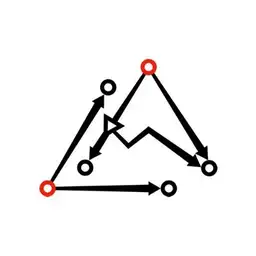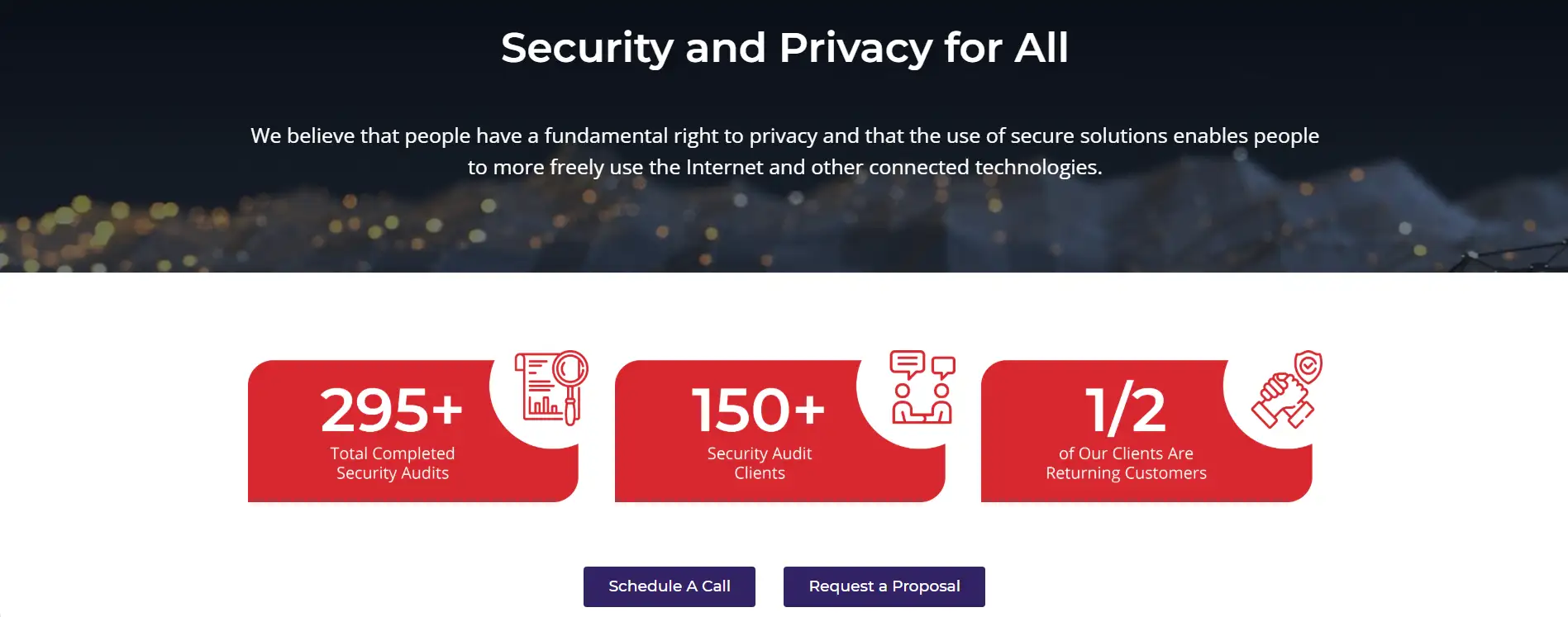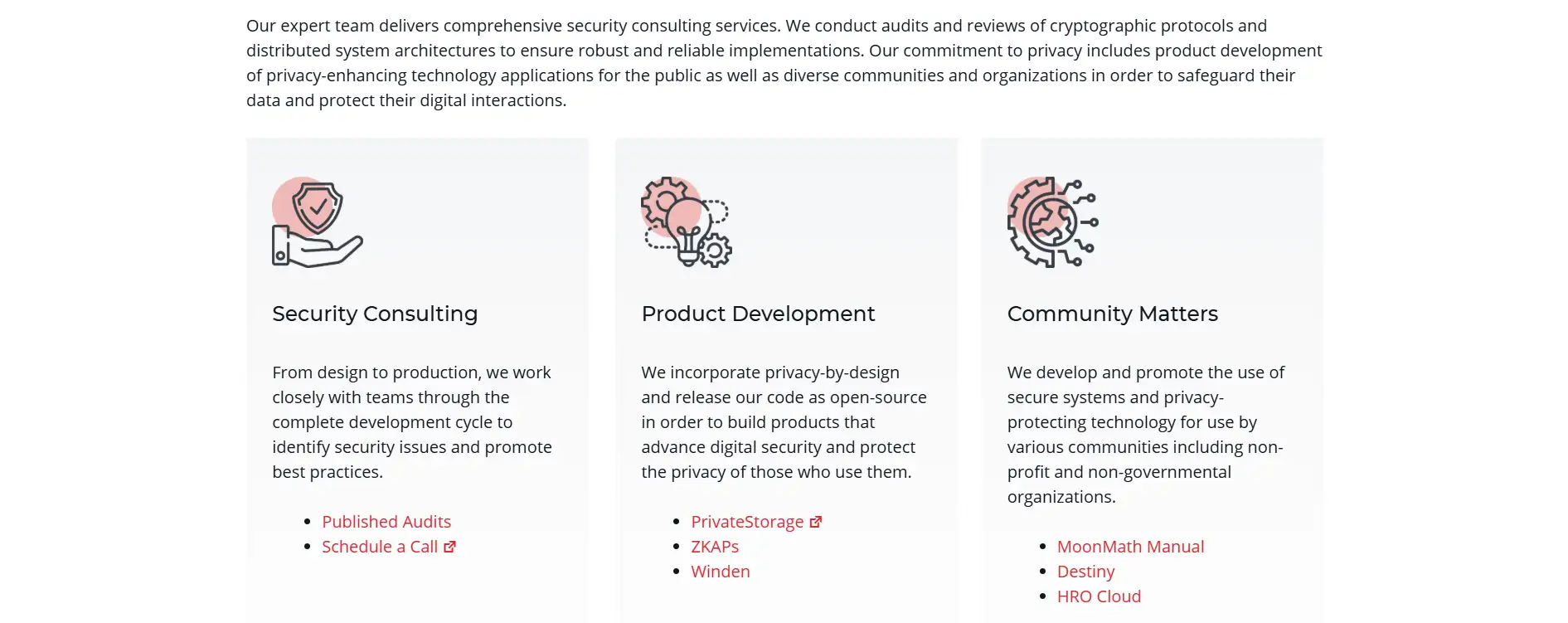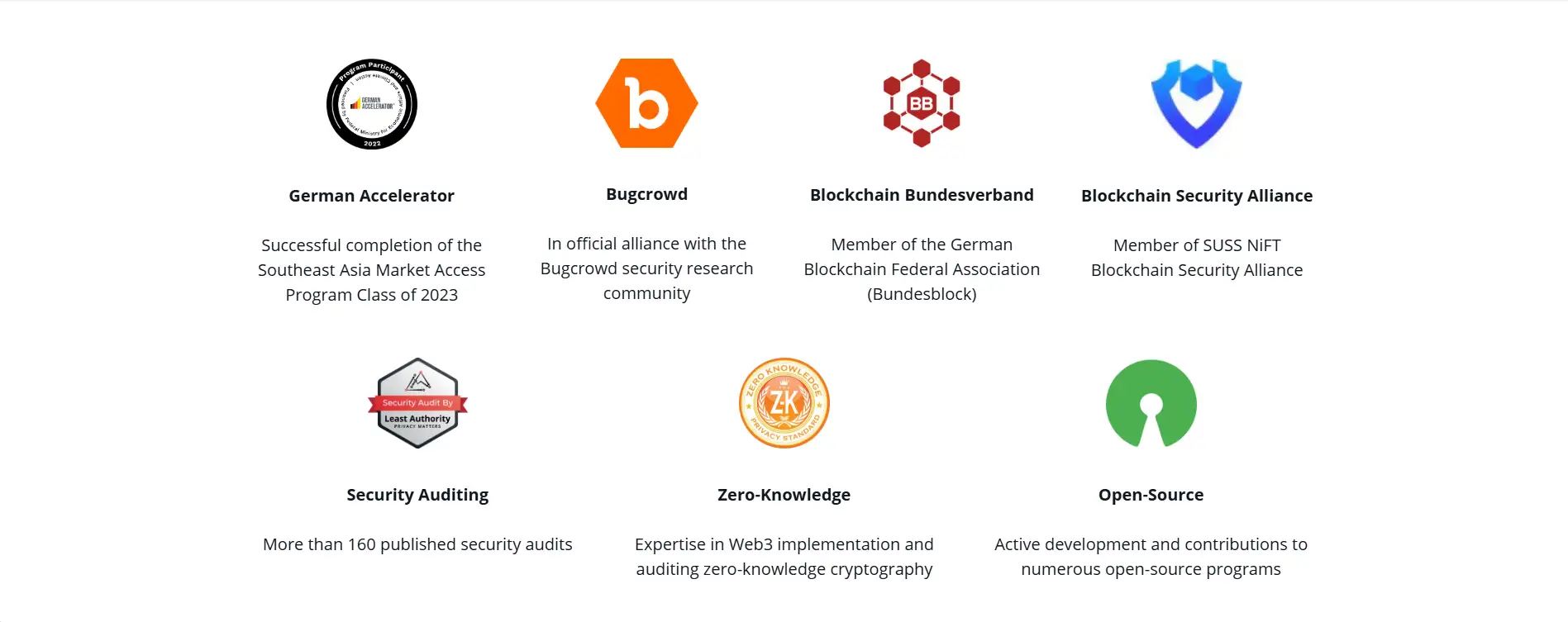About Least Authority
Least Authority is a specialist firm delivering end-to-end security consulting and privacy-preserving solutions for Web3, distributed systems, and modern Internet applications. Guided by the Principle of Least Authority (PoLA), the company helps teams design, build, and launch resilient systems by auditing cryptographic protocols, smart contracts, and distributed architectures, and by integrating security-by-design and privacy-by-design from the earliest phases of development. In parallel, it advances open, verifiable tooling through open-source product development and community programs, ensuring that security improvements benefit the broader ecosystem.
With a track record spanning from 2014 security audits (including work that identified issues preceding the historical DAO incident) to 160+ published audits, Least Authority has become a trusted partner for organizations that require deep expertise in zero-knowledge cryptography, formal design reviews, and real-world readiness checks before mainnet launches and major releases. The team also builds privacy-enhancing tools—such as PrivateStorage, ZKAPs, and research like the MoonMath Manual—to make practical privacy accessible. Whether you need a thorough security audit, a rapid limited security evaluation, or ongoing security-by-design consulting, Least Authority supports your project from concept to production with a principled, engineering-first approach.
Least Authority exists to make security and privacy practical for real products and communities. Founded in 2011 with a mission to build freedom-compatible technologies, the organization has focused on decentralized systems (often referred to as Web3) since its early years, initiating security auditing work in 2014. Over time, the company has delivered more than 160 published audits spanning smart contracts, L1/L2 protocols, cross-chain bridges, staking and custody systems, and privacy-preserving applications. Its methodology blends careful manual analysis with adversarial thinking, dependency review, and structured verification steps to help clients ship safer software.
The firm offers three primary engagement types that map cleanly to typical product lifecycles. First, Security Audits—best suited when an implementation is feature-complete or approaching critical milestones (e.g., mainnet launches, major upgrades)—provide an in-depth investigation of vulnerabilities and remediation paths. Second, Limited Security Evaluations deliver focused 1–3 day assessments for self-contained systems (e.g., authentication flows, encryption schemes) or third-party due diligence. Third, Security-by-Design Consulting embeds security thinking earlier—aligning architecture, roadmaps, and development processes to reduce risk and save future remediation costs. This spectrum lets teams choose the right intervention at the right time, from design to production.
Beyond consulting, Least Authority invests in privacy-enhancing technology and community efforts. Products like PrivateStorage and mechanisms such as ZKAPs (zero-knowledge access passes) put privacy and data minimization into users’ hands, while research and educational projects—e.g., the MoonMath Manual to zk-SNARKs—demystify zero-knowledge cryptography for developers and advocates. The organization collaborates with NGOs and diverse communities to promote secure systems and make privacy-protecting technology accessible where it’s needed most.
The firm’s process is transparent and collaborative. A typical engagement flows from free initial consultation and scoping to proposal, code review, an Initial Audit Report (for internal remediation), response and remediation support, verification of fixes, and a Final Audit Report suitable for publication. This cadence ensures issues are not just found—but understood, prioritized, and resolved. Relationships with communities like Bugcrowd and memberships such as the German Blockchain Bundesverband and SUSS NiFT’s Blockchain Security Alliance further connect audits to a wider security ecosystem.
In the security landscape, clients often compare providers such as Trail of Bits, OpenZeppelin, Quantstamp, NCC Group, Halborn, Sigma Prime, and ConsenSys Diligence. Least Authority differentiates through its deep commitment to privacy, its long-running focus on zero-knowledge systems, its open-source ethos, and a process designed to support teams from initial design through post-audit verification. For teams building critical infrastructure or user-facing apps, this principled approach reduces risk while accelerating readiness for production. For details or to start a conversation, visit Least Authority.
Least Authority provides comprehensive benefits and features tailored to high-stakes Web3 and privacy projects:
- End-to-End Security Services: From security-by-design consulting to deep security audits and limited evaluations, engagements align with your product’s lifecycle. Least Authority
- Zero-Knowledge Expertise: Auditing and implementing zero-knowledge systems, with practical resources like the MoonMath Manual and ZKAPs.
- Open-Source Commitment: Code and research released under open-source licenses to maximize verifiability and community benefit.
- Privacy-Enhancing Products: Real user tooling such as PrivateStorage and privacy-by-design mechanisms that reduce data exposure.
- Transparent Audit Process: Clear stages—proposal, code review, initial report, remediation, verification, final report—for accountable outcomes.
- Ecosystem Engagement: Collaboration with communities and NGOs to deploy secure systems where they matter most.
- Dependency & Architecture Review: Attention to upstream libraries, supply-chain risk, and distributed architectures.
- Realistic Timeframes & Scope: Options ranging from 1–3 day limited evaluations to multi-week audits for complex systems.
Getting started with Least Authority is straightforward—choose the engagement that fits your stage and align deliverables and timelines early. Begin at Least Authority.
- Initial Contact & Goals: Outline your system (architecture, threat model, dependencies) and your milestone (e.g., mainnet launch, token-gated release, major upgrade).
- Share Materials: Provide repositories, build/run instructions, specs, and any prior reviews to enable efficient scoping.
- Proposal & Scope Lock-In: Agree on focus areas (smart contracts, cryptographic protocols, bridge logic, key management), schedule, and fixed-price terms.
- Audit or Evaluation Execution: Collaborate during code review; clarify assumptions, env configs, and edge-cases; maintain a stable audit branch.
- Initial Report & Remediation: Receive findings with Issues and Suggestions; prioritize fixes, document mitigations, and implement patches.
- Verification & Final Report: Submit diffs for verification; once issues of sufficient impact are addressed, receive a Final Audit Report suitable for publication.
- Ongoing Security-by-Design: Schedule periodic reviews for major updates, dependency changes, and new features; integrate privacy-by-design for data-sensitive components.
Least Authority FAQ
Least Authority takes its name from the Principle of Least Authority (PoLA), a core security best practice. In audits, this principle guides their recommendations to ensure that every system component only has the minimum privileges required to perform its function. By limiting access and authority across the architecture, they reduce the risk of exploitable vulnerabilities and minimize the potential damage from compromised components. Learn more at Least Authority.
Yes — zero-knowledge cryptography is one of Least Authority’s core specializations. They have audited complex zk-SNARK and zk-STARK systems, produced the MoonMath Manual to help developers understand these technologies, and developed ZKAPs (Zero-Knowledge Access Passes) for privacy-preserving access control. This deep experience allows them to identify edge cases and strengthen protocols using zero-knowledge proofs.
A Limited Security Evaluation from Least Authority is ideal for focused, time-sensitive assessments. Lasting 1–3 days, these evaluations are designed for smaller, self-contained components like authentication flows, encryption schemes, or third-party integrations. They deliver quick insights into potential risks without the extended timelines or cost of a full audit, helping teams address specific security concerns before they escalate.
Beyond code reviews, Least Authority supports security-by-design practices from the earliest architecture stages. They work with teams to integrate threat modeling, privacy-by-design principles, and dependency reviews into the development process. They also build privacy-enhancing products like PrivateStorage and contribute to community education, ensuring that security and privacy improvements extend beyond a single engagement.
Yes — Least Authority has extensive experience in auditing both traditional software systems and blockchain-based platforms. Their portfolio includes work on distributed systems, Web3 protocols, smart contracts, and cryptographic applications. This versatility allows them to apply cross-domain expertise, strengthening systems that combine conventional architectures with decentralized components.
You Might Also Like












